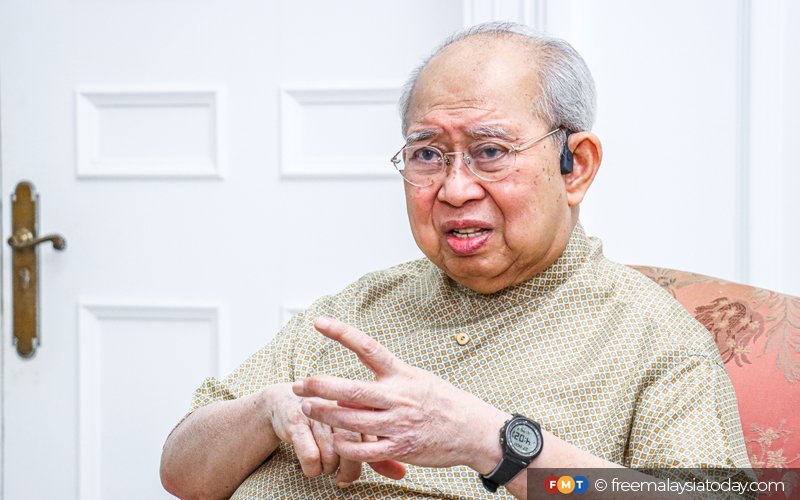5% oil royalty is the agreement, not ‘wang ehsan’, says Ku Li

There is no such thing as the payment of “wang ehsan” (compassionate money) to states under the Petroleum Development Act, says Tengku Razaleigh Hamzah, founding chairman of Petronas.
(FMT) – The veteran politician said the agreement between Petronas and the respective state governments was for the oil company to pay the states 5% in cash payments in exchange for them vesting their hydrocarbon or oil and gas rights in Petronas.
There was no mention of any wang ehsan in the Act’s vesting deed, he maintained, while the 5% figure came out of calculations performed by former Sarawak chief minister Abdul Rahman Ya’kub, which was jointly agreed upon by the states and Petronas.
“Under the Petroleum Development Act and the vesting deed that is part of the Act, there’s no way you can pay what you call wang ehsan, because there’s no provision for that under the law.
“The agreement was between the respective state governments in Malaysia with Petronas, it’s not an agreement between the respective state governments and the federal government,” he said in an interview with FMT.
Tengku Razaleigh, familiarly known as Ku Li, said finance minister Tengku Zafrul Aziz might not have been briefed thoroughly on the law, as far as the relationship between states and Petronas is concerned.
He said Petronas was duty-bound to pay 5% to each state within the federation in exchange for the vesting of their oil and gas rights.
“(Rahman) was the man who offered this formula so that we can put all the oil resources of the country into Petronas, a single organisation, belonging to Malaysians, and not to any state or any entity.
“And that was a simple calculation. Out of that money that is placed in Petronas, after all costs have been taken care of, Petronas then pays 5% to each state as cash payment yearly. There was no quibble about it.”
Tengku Zafrul recently said Putrajaya would not pay oil royalty to any state in Peninsular Malaysia, including Kelantan, which will instead continue to receive wang ehsan for petroleum produced off its coast.
This was met with disappointment by the Kelantan state government, with deputy menteri besar Mohd Amar Nik Abdullah expressing shock at the finance minister’s statement.
The beginning of ‘wang ehsan’
Tengku Razaleigh said the payments of wang ehsan first began “out of the blue” when the Dr Mahathir Mohamad government decided not to continue paying the 5% royalty to Terengganu after PAS took over the state government in the late 1990s.
“The leadership of Umno decided that we won’t pay them for fear they might use this money wrongly, and may even use it for political purposes,” he said. “That was the thinking anyway.”
However, the wang ehsan was totally different compared to the 5% cash payment, as it was difficult to ascertain the amount derived.
On the other hand, the 5% payments were based on Rahman’s formula which was agreed upon by the states and Petronas, he said.
“I went to every state to bring this draft vesting deed agreement to be examined by the respective state governments, because we wanted unity. And all the state governments took time to study it.
“Then I went to every state again to negotiate, not just with the chief minister or menteri besar, as the case may be, but with the exco members, and they were very happy to accept what was proposed by Sarawak.”
He maintained that he was not saying that the wang ehsan payments were bad or good, but that there was already an agreement between Petronas and the states which should be honoured by Putrajaya.
The former finance minister said it showed that the federal government “couldn’t give two hoots” to an agreement signed by a sovereign state within the federation of Malaysia, which could deter foreign investors.
“If you cannot honour a simple agreement among yourselves which you signed some time ago, how can you expect foreigners who want to come and invest here to accept that kind of behavior?
“If Putrajaya feels strongly about wanting to continue to pay under this wang ehsan scheme to the various states concerned, they can continue.
“But I’m just saying that, under the vesting deed agreement, which is part of the Act, you can’t run away from the fact that whatever you make, 5% must go to the state as cash payment. That is the agreement.”

